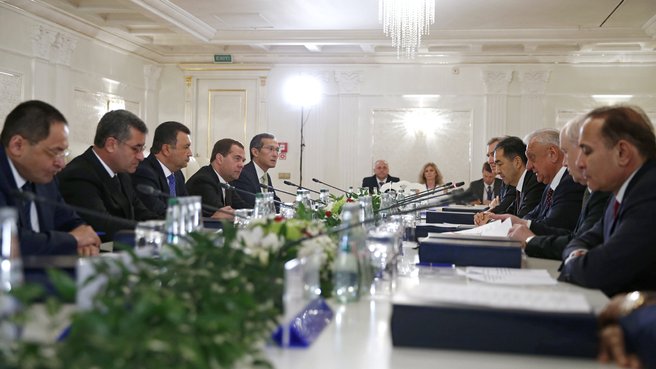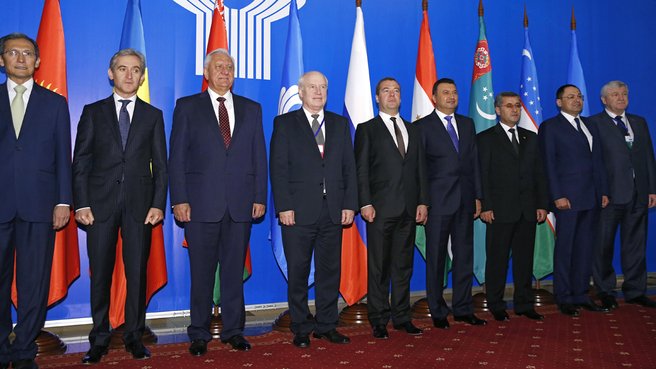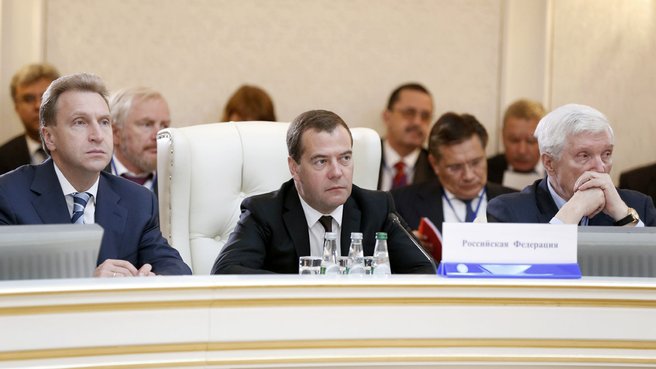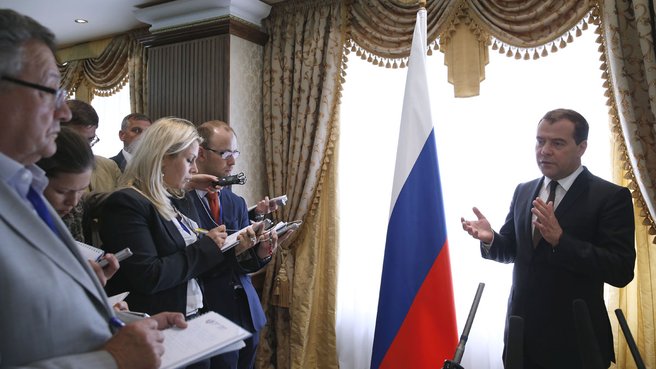Over 20 documents and decisions on the activities of the CIS were submitted at the meeting, relating to the socioeconomic sphere, innovation, culture, healthcare, education and sport.
Meeting of the CIS Council of Prime Ministers
List of documents signed at the meeting
Dmitry Medvedev takes questions from journalists
A limited-attendance meeting of the CIS Council of Prime Ministers was held prior to its expanded session.
List of the heads of CIS delegations:
Prime Minister of Armenia Hovik Abrahamyan
Prime Minister of Belarus Mikhail Myasnikovich
Deputy Prime Minister of Kyrgyzstan Dzhoomart Otorbayev
Prime Minister of Moldova Iurie Leanca
Prime Minister of Russia Dmitry Medvedev
Prime Minister of Tajikistan Kokhir Rasulzoda
First Deputy Prime Minister of Azerbaijan Yaqub Eyyubov Abdulla oglu
First Deputy Prime Minister of Kazakhstan Bakytzhan Sagintayev
Deputy Prime Minister of Turkmenistan Annamuhammet Gocyyev
Deputy Prime Minister of Uzbekistan Adham Ikramov
Ambassador Extraordinary and Plenipotentiary of Ukraine to Belarus Mikhail Yezhel
Chairman of the Executive Committee – CIS Executive Director Sergei Lebedev
After the expanded meeting, members of the CIS Council of Ministers signed the following documents:
– decision on the fulfilment of the CIS Interstate Programme of Innovative Cooperation in 2013 and up to 2020, and a package of measures for its implementation in 2012-2014.
– agreement on interstate exchange of scientific and technical information;
– agreement on CIS information cooperation in ensuring transport safety;
– decision on the activities of the Interstate Council on Anti-Monopoly Policy;
–decision on the activities of the Council on CIS Cultural Cooperation.
Dmitry Medvedev answered journalists’ questions following a meeting of the CIS Council of Prime Ministers
Transcript:
Question: Taking into account the documents signed in Astana giving an additional boost to our relations, do you think the CIS is behind times so much that it is either lagging behind or can only act as a political body?
Dmitry Medvedev: The CIS has a number of drawbacks, this is true. If we speak of the degree of integration, in many cases it is minimal. However, there is nothing better than the CIS for those countries that set it up and joined it. This is the reason for us to believe that there should be various kinds of associations. We made a tremendous step forward by signing yesterday a Treaty on the Eurasian Economic Union between our countries - Russia, Belarus and Kazakhstan. Two more nations may join soon, and this is our future. But we have to communicate, we have to discuss other issues with those countries that are not ready or willing to join that Union, the countries that have no legal or economic grounds for joining, yet they are still close partners, important countries for us and we have close ties with the people of those countries. In this context the meaning of the CIS still holds since there is no other venue for a number of issues we were discussing today, for instance, antimonopoly agencies or cultural ties, whereas those issues would never be resolved on a bilateral basis. This is why I believe that the Commonwealth of Independent States is alive, and I think it is one of the formats for our interaction. Naturally, we put a major stake on other, more advanced forms. That’s the way it is.
Question: What are the chances of Ukraine quitting the CIS and what will the Commonwealth lose in that case? Was this issue on the agenda today?
Dmitry Medvedev: This issue was not discussed today. Ukraine took part in our meeting, the CIS Council of Prime Ministers meeting, represented by Ukraine’s Ambassador to Belarus. As far as I understand, he did not have any particular powers, he was just present and heard everything.
You know, when any nation quits an association, it is not a good outcome, first of all for the quitting nation itself. A question arises: what for? The CIS with all its disadvantages and a certain lack of structure is based on a multitude of legislative acts and conventions singed by the member-states that are in effect in those countries, that set the rules in various areas and involve a huge number of people. What will they gain once they quit? Georgia quit, and have things taken a turn for the better? They tell us in private “Of course, we lost out in the end …” It is their business, nobody wants to impose anything on them but we should bear in mind that, apart from what I have said, the CIS is also what we achieved a short while ago – a free trade zone. If they stop working in that format, they will clearly bear economic losses as well. If that is the price they want to pay for their policy, they are entitled to it, but I think they should weigh up the interests of Ukraine’s citizens if such issues are on the agenda.
Question: Mr Medvedev, the gas talks continued in Berlin today between Russia, Ukraine and the EU. Am I right in thinking that the meeting was fruitless because Ukraine has not transferred the money? Does it mean Russia will stop gas deliveries to Ukraine on June 3, or is there any chance that Gazprom will review the deadline?
Dmitry Medvedev: There is a chance not only that Gazprom will review the deadline but also that they will make a payment. As they say, hope springs eternal. I have just spoken to Gazprom Chairman of the Board Alexei Miller. The talks are still in progress. There have not been any significant results as yet but our Ukrainian partners said they had transferred a certain amount to cover some of the outstanding debt. However, the debt is considered settled, even partly, not at the time the money is transferred but when it arrives in the creditor’s account. If the gas supplier, the Russian company Gazprom, receives the money, we will have to look at the amount, and it is going to be a slightly different story; it will mean we can carry on. Now we must make sure that they are willing to pay. There can be no other wording of the issue. When I hear “Give us a different price, and we will pay,” it’s just offensive. Honest partners never behave like that, even not-so-honest ones don’t. They must pay. Period.












